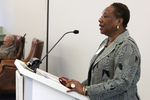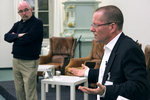
Optimizing Talent - Closing Education and Social Mobility Gaps Worldwide: Higher Education and Lifelong Learning
Abstract
Education provides an essential key to realizing true individual potential. Ideally, an equitable and effective educational system facilitates social mobility and leads to the development and increased prosperity of its citizens, and thus of societies as a whole. While great strides have been made in providing enhanced access for children and adults to quality education worldwide, substantial gaps remain. The Salzburg Global Seminar (SGS) and the Educational Testing Service (ETS) have convened a seminar series to identify where these educational and social mobility gaps still exist, what effect they have, why they persist - or even increase - with rapid economic change, and what steps can be taken to eliminate them.
This second session, following on from the first sessionhttp://www.salzburgglobal.org/current/sessions.cfm?IDSpecial_Event=3099 which considered education up to age 18, will focus on higher education and lifelong learning. Similar in format to the 2011 meeting, it will bring together 60 leading education researchers, policy makers, practitioners and advocates from around the world to analyze successful and promising case studies that show an effective narrowing of educational and social mobility gaps.
Papers are being commissioned around broad issues of policy and finance and how they relate to questions of access, retention, attainment, and completion, issues of quality as well as differentiations and value added at the tertiary education level. The topics of life-long learning and successful transitions from secondary to tertiary education and then into the workforce will also be addressed. The ultimate goal is to identify, develop, and refine existing and new policy strategies that enable greater social and educational mobility thereby optimizing young peoples' talent across all strata of society in a way that has the broadest benefit and deepest impact on individuals and the societies of which they are a part.
Faculty

















Related News
Salzburg Global Seminar Expands Partnership with ETS
Building the Bridges to Untapped Talent
Students at the Margins and the Institutions That Serve Them - A Global Perspective
Marybeth Gasman - Academic Achievement, Quality of Life, and Happiness
Reaching the Destination
Optimizing Talent - Day Three - The Divine Wisdom Present in Every Human Being
Optimizing Talent - Day Two - Equity in Education - Treating All Differences Equally
Optimizing Talent - Day One - Daring to Think the Unthinkable
Optimizing Talent
‘If you believe education is too expensive, try ignorance’
Program
Thematic Foci
The seminar will address each of the following broad themes from national, regional, trans-national, global, and comparative perspectives:
- Education - What are the postsecondary knowledge and skills required for social mobility in the 21st Century? The world has a rich variety of postsecondary institutions, delivery systems, human talents, abilities and conditions. What is the differential value of various types of postsecondary curriculum? What are the differential opportunities for the variety of human talents and conditions? What are the opportunities and challenges in the pursuit of quality postsecondary education?
- Policy - What policies (national, regional, trans/supra-national, local) will allow for and sustain social mobility? What are the policy strategies and processes for advancing educational achievement, access and attainment, quality assurance, etc. especially for the most disadvantaged populations?
- Finance - what are the costs of creating and delivering postsecondary educational opportunities to ensure social mobility? How can investment and resources be leveraged? Who should pay for it and how?
- Transitions - Discussions will focus on the sequence of access, retention, completion, attainment, and life-long learning from secondary to post-secondary (including vocational education, community colleges, universities, and adult education) and how each aspect of this sequence can contribute to increased social and educational mobility.
Format
A series of papers are being commissioned to address the general themes outlined above. The papers will be posted roughly 4-6 weeks prior to the start of the session so that all participants can read them. Paper authors will sit on panels organized according to focus, theme, and/or region. The purpose of the panels will be for authors to briefly summarize the key points of their papers and to raise the most pressing questions related to them. The panels will form the basis for continued plenary discussion.
Time will also be devoted to smaller working groups (about 8-12 participants per group). Working groups will meet several times throughout the seminar to discuss the issues and questions that emerge from the papers and plenary panels in more depth. Each group will be tasked with providing broader context, critique, and clarity to the information from the papers and presentations that is based on and incorporates their own expertise and experience.
Additional programmatic formats, such as topical or thematic meal tables, role playing and scenario planning exercises, and informal time for networking will also be an important element of the program.
Participant Profile
This seminar will gather approximately 65 faculty, contributors, and participants from more than 25 countries around the globe to share experiences and information from different sectors, countries and perspectives. Participants will represent a variety of professional backgrounds and sectors including those working in and with higher education institutions, policy makers, researchers, NGO representatives, and the private sector.
We are seeking to involve senior decision makers as well as younger leaders who will continue to develop and influence educational policy at locally, nationally, regionally, and globally for years to come. While there will be a number of featured speakers, all participants will have concrete experience to bring to the table.
In addition to professional diversity, participants will reflect diversity based on geography, gender, age and experience.
Downloads
Session Schedule
Click here to download the session schedule
Session Documents
Acces to Higher Education in the Post-Soviet States: Between Soviet Legacy and Global Challenges
Anna Smolentseva, Senior Research Fellow, Higher School of Economics, Institute for Educational Studies, Moscow, Russian Federation
Conceptions of Academic Talent: Perspectives in Higher Education
Zena Richards, Transformation Student Equity Project Manager, University of Witwatersrand, Johannesburg, South Africa
Equal Opportunities in Higher Education: Policy and Practice in the EU before the Debt Crisis
Cecile Hoareau, Research Fellow, University of Maastricht; Project Leader, Empower European Universities, Maastricht, The Netherlands
Higher Education and Social Mobility in KoreaHi-Won Yoon, recently President for International Affairs and Director of the Centre for Multicultural Education, Seoul National University, Seoul, Republic of Korea
Higher Education Brazil: History, Policies and a Case StudyMauricio Garcia, Vice President of Planning and Academics, DeVry Brazil, Fortaleza-CE, Brazil
Memorandum on Global Student Cooperation(Global Student Leadership Summit, London, 18 - 21 September 2012)
Opportunities for All? The Equity Challenge in Tertiary Education
Jamil Salmi, Indepent Expert; former Education Sector Manager, The World Bank, Washington DC, USA
Optimizing Teacher Talent for Student Success: The Role of Quality Assurance for and Accreditation of Teacher Preparation
Deborah Eldridge, Senior Vice President, National Council for Accreditation of Teacher Education, Wahington, DC, USA
Social Mobility and Higher EducationTessa Blackstone, Former Vice Chancellor, University of Greenwich; Life Peer, House of Lords, London, UK
Statement of the Global Student Leadership SummitLondon, 18 - 21 September 2012
Related Internet URLs
"Tracking Learners' and Graduates' Progression Paths - TRACKIT"
Michael Gaebel, Kristina Hauschildt, Kai Mühleck, Hanne Smidt
ETS Policy Notes (Vol. 20, No. 3) "Optimizing Talent: Closing Education and Social Mobility Gaps Worldwide - Basic Education Up To Age 18"
Daily Session Reports
Daily Newsletter - FridayDaily Newsletter - SaturdayDaily Newsletter - ThursdayDaily Newsletter - WednesdayDaily Newsletters - Wednesday to Saturday
Testimonials
"What a wonderful and yet bittersweet time. This has been an unexceptional time. So many wonderful, unforgettable memories."
Participant from USA
"Thank you so much for everything. It has been a really beautiful experience. Impossible to forget. New friends. New Learnings."
Faculty from USA
"Closing education gaps is one of the most difficult challenges of our time. Session 495 brought together some of the most talented people of the world to address the challenge. The SGS has been the ideal place."
Faculty from USA
"Thank you for such an inspirational conference. It was great networking and making new friends and colleagues, who share the same interests. Well done!"
Fellow from Malta

























